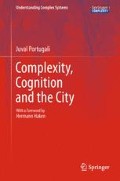Abstract
Since early days paradoxes have been useful (and enjoyable) analytical tools; mainly due to their capability to expose things that are wrong when everything appears to be right. Zeno paradoxes are a good example to their use in antiquity, while in modern science theoretical physics stands as a domain where paradoxes are intensively used. This is not the case with cities and their planning, however. This chapter introduces paradoxes as useful means to study predictions in the context of cities and their planning. It discusses several city planning paradoxes and suggests seeing their origin in the complexity of cities and in the role played by cognitive maps and information exchange in complex, self-organizing cities.
Access this chapter
Tax calculation will be finalised at checkout
Purchases are for personal use only
Notes
- 1.
For a somewhat different view see Aharonov’s notion of weak measurements (Aharonov and Rohrlich 2005). Most theoreticians of quantum theory would not subscribe to Everett’s nor to Bohm’s explanations. The reason being “decoherence” (Zurek 2003), namely, that the cat’s fate is not that of a microscopic quantum system but rather of a macroscopic “classical” body. I’m indebted to Professor Hermann Haken for turning my attention to this point.
Author information
Authors and Affiliations
Corresponding author
Rights and permissions
Copyright information
© 2011 Springer-Verlag Berlin Heidelberg
About this chapter
Cite this chapter
Portugali, J. (2011). Learning from Paradoxes about Prediction and Planning in Self-Organizing Cities. In: Complexity, Cognition and the City. Understanding Complex Systems. Springer, Berlin, Heidelberg. https://doi.org/10.1007/978-3-642-19451-1_14
Download citation
DOI: https://doi.org/10.1007/978-3-642-19451-1_14
Published:
Publisher Name: Springer, Berlin, Heidelberg
Print ISBN: 978-3-642-19450-4
Online ISBN: 978-3-642-19451-1
eBook Packages: EngineeringEngineering (R0)

